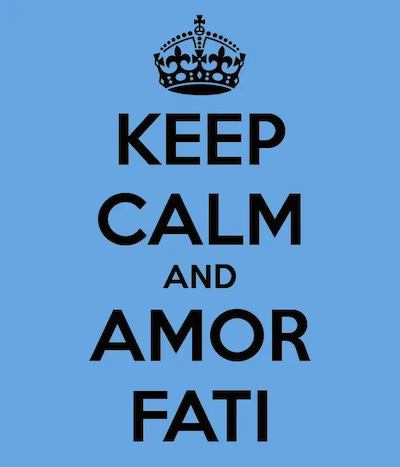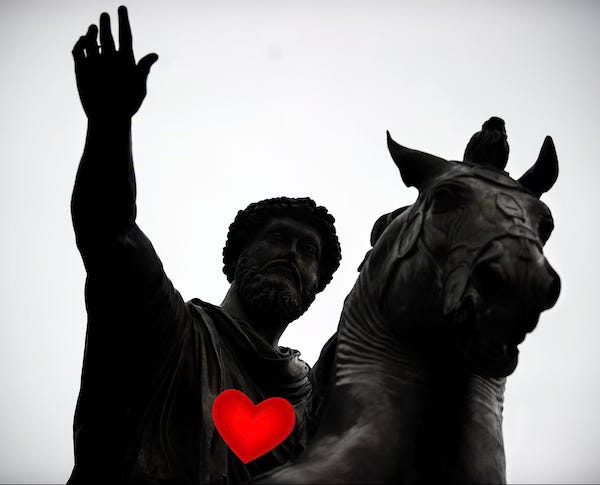Here we go again, Valentine Day is coming! And we are all preparing for a night of going to overpriced restaurants, eating mediocre food accompanied by so-so wine, and going home with the vague sensation that someone, somewhere, has manipulated the whole country into this kind of thing just to make money. And that’s if it goes well, of course. And if you are lucky enough to have a Valentine this year.
Fear not, Stoic advice is here to help. First, some preliminaries, beginning with the historical background. Valentine Day was established by Pope Gelasius I back in 496 CE, to celebrate the Christian martyr Saint Valentine of Rome, who was killed in 269. Not exactly a romantic beginning. In fact, V-Day was not associated with romanticism until the time of Geoffrey Chaucer (14th century), and it began to look like the modern ritual of lovers exchanging flowers, sweets, and cards, in 18th century England. The mass production of Valentine cards began in the 19th century, which pretty much brings us to the situation as we know it today.
(I’m sorry to say, incidentally, that there is no historical connection between Valentine and the ancient Roman festival of lupercalia. Too bad, that one must have been fun!)
Before we get into practical advice, let me set the fundamental Stoic notion that applies in this case: Epictetus’s fundamental rule of life:
“Some things are up to us, while others are not. Up to us are opinion, motivation, desire, aversion, and, in a word, whatever is of our own doing; not up to us are our body, our property, reputation, office, and, in a word, whatever is not of our own doing.” (Enchiridion 1.1)
As well as what I call Epictetus’ promise, if you truly accept, internalize, and practice the dichotomy of control:
“If you have the right idea about what really belongs to you and what does not, you will never be subject to force or hindrance, you will never blame or criticize anyone, and everything you do will be done willingly.” (Enchiridion 1.3)
We are now prepared to tackle a series of likely scenarios on a typical Valentine Day. Ready? Set. Go.
I. I don’t have a Valentine, I’m a horrible person!
Ask yourself: is having a date for Valentine Day up to you? No, of course not. Despite your best wishes and attempts, it is ultimately someone else’s decision whether to go out with you that night or not.
So what should your attitude be? “This is not up to me, what is up to me is to remain in harmony with myself and with my fellow human beings.” (That one is from Enchiridion 4.)
Where should your focus be? On being a nice person, the kind of person that others may want to consider going out with. (Caveat: it does not logically follow that if you didn’t get a date then you are not a nice person, since Fortuna sometimes gets in the way.) Meanwhile, call up a friend, or organize for yourself a nice evening at home, doing some of your favorite things.
II. I have a date, but the other person is very late. This is going to be a disaster!
Ask yourself: is the punctuality of your date up to you? No, of course not. They may have legitimate reasons for the delay, like a car accident, traffic, or suboptimal public transport. Besides, have you never been late at an appointment? Really? (See Meditations X.30)
So what should your attitude be? “This is not up to me, what is up to me is to remain in harmony with myself and with my fellow human beings.”
Where should your focus be? On making the best of your wait, perhaps reading a book (never leave home without one!). Then on genuinely being glad when the other person shows up, not compounding their likely guilt with your own pouting.
III. I’m on a date, but the restaurant I picked is horrible. This is going to be a disaster!
Ask yourself: is the quality of the food, or of the service, up to you? No, of course not. Even if you did some research, asked friends, checked online reviews, and so on, there is still a chance that tonight things are just not going to work well.
So what should your attitude be? “This is not up to me, what is up to me is to remain in harmony with myself and with my fellow human beings.”
Where should your focus be? On making the best of the evening anyway, for both yourself and your date. Joke about it, even better if in a self-deprecating manner. As Marcus Aurelius says (in Meditations V.20), “the impediment to action advances action, what stands in the way becomes the way.” Find another way to make the evening a success. Or at least endurable.
IV. I’m on a date, but my partner is not turning out to be the kind of person I expected them to be. This is going to be a disaster!
Ask yourself: is the character of your date up to you? No, of course not. If they are boring, nasty, or just not that interesting, that is on them, not you.
So what should your attitude be? “This is not up to me, what is up to me is to remain in harmony with myself and with my fellow human beings.”
Where should your focus be? On redoubling your efforts to make the evening pleasant for your companion no matter what. Consider it a challenge to refine your virtue, as all externals are anyway. At the end of the day, you are facing another human being who has been kind enough to spend an entire evening with you. Treat them like you would like them to treat you. Besides, perhaps you are the one who’s not that interesting… (Enchiridion 33.14).
V. The day is over, and I have the terrible feeling that tonight is not going to change my life and make me happy forever after. This is horrible!
Ask yourself: is your happiness up to you? Yes, of course it is! At least, from a Stoic perspective. Because by “happiness” Stoics mean eudaimonia, what is more properly rendered as a life worth living. Did you not pay attention to Epictetus’s promise above? Your life’s worth depends only on you, because that worth is measured by how good of a human being you are, by what judgments you make about situations, and by how you decide to act or not to act. None of which is determined by the outcome of a date.
So what should your attitude be? “This is up to me, so I need to work first and foremost on this, and take the rest as it comes, with equanimity.”
Where should your focus be? On practicing in order to achieve excellence (arête) as a human being. You have multiple ways to do this. You could use the four cardinal virtues (practical wisdom, courage, justice, and temperance) as a moral compass to chart your trajectory in life. Or you could practice the three disciplines of Epictetus (desire and aversion, action, and assent). Or you could adopt Epictetus’ role ethics as a framework for how to best interact with others.
No matter what you do, remember that the two fundamental things about you—and everyone else—are that we are highly social animals capable of reason. As Marcus says:
“Do you have reason? I have. Why then do you not use it?” (Meditations IV.13)
Happy Valentine!







Love ❤️ this! 😄
It'll be snow shovels and Skidoo suits for my wife and me today. Romantic, n'est pas?